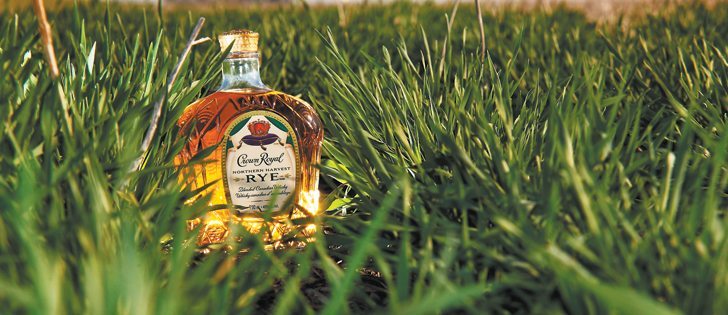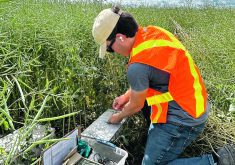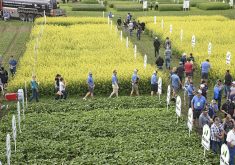Once a popular prairie crop, rye has taken a backseat to more profitable crops in recent decades.
But factors are coming into play to put fall rye back in our vocabulary: KWS hybrid rye varieties are now available through a Regina-based farmer-owned company called FP Genetics. About 20,000 acres of those hybrids are growing on prairie farms.
In this Special Report, Western Producer reporter Ron Lyseng writes about what’s new with an old crop.
Millers and distillers in the central United States annually import about 160,000 tonnes of rye from Scandinavia, shipping it up the Mississippi River as far north as Minneapolis.
Read Also

New program aims to support plant-based exports to Asia
Understanding the preferences of consumers in Taiwan and how they differ from Indonesia or Malaysia isn’t easy for a small company in Saskatchewan.
Unloaded at Mississippi piers, the rye is priced at US$7to $8 per bushel.
Canadian prairie farmers might have a huge transportation advantage over Scandinavia given their proximity to the U.S., but American millers and distillers buy only about 80,000 tonnes of fall rye from Canada each year.
The Mississippi rye volume does not account for Scandinavian rye that lands on the eastern American seaboard.
Other stories in this WP Special Report:
So if Canadians can’t compete in U.S. rye markets in their own backyards, despite enjoying most of the advantages, what’s going on?
“Our biggest issue in not supplying that neighbouring market to the south is that we don’t have the consistent quality or consistent quantity they require,” says Rod Merryweather of FP Genetics in Regina, a farmer-owned seed company that has so far released two new hybrid fall rye varieties.
He says quality and quantity relate directly to genetics.
Canada’s older conventional varieties do not keep pace with the expectations of buyers, or growers. He says production has dropped in Western Canada to about half of what it was five years ago.
Merryweather says the only way to meet the quality and quantity criteria is to seed only hybrid varieties.
However, there has been no Canadian innovation in rye breeding in the past 25 years, which is why it’s becoming obsolete.
“Hybrid rye generally yields about 30 percent higher than the conventional rye varieties we’ve been growing, and 15 percent higher than winter wheat. And right now prices are higher than winter wheat,” says Merryweather.
The two hybrids FP Genetics has released, Brasetto in 2014 and Bono in 2015, come from the German seed company KWS.
The Scandinavian-grown rye imported by American users also comes from KWS stock. The rye coming up the Mississippi is KWS Brasetto and Bono, the same two hybrids now registered for growers in Canada.
“Brasetto is the variety with 30 percent higher yield. Our latest hybrid is Bono and it has another 10 percent yield increase over Brasetto,” says Merryweather. “These varieties are a lot more uniform because they’re hybrids. You generally get better quality and the seeds are all very similar.
“The biggest benefit is that the falling numbers are 60 to 100 points higher than conventional rye. The open varieties farmers have been growing would have a falling number in the range of 180 to 200 if it was good quality. Our hybrids are in the range of 260 to 280. That’s a huge consideration for buyers. The falling number is their criteria to judge if they can make a quality product.”
The falling number test measures baking characteristics.
At the moment, FP Genetics has numerous side-by-side Brasetto-Bono comparisons in the ground, waiting for the spring. The trials are 80 acres of each hybrid along with 80 acres of conventional rye. Merryweather expects that half their seed sales for the coming fall will be Bono.
“We had 20,000 acres of hybrid rye last year, mostly Brasetto. We’re hoping to double that in 2016. We expect to eventually grow that number to 100,000 acres. That volume would be just enough to satisfy the nearby markets along the Mississippi.
“Here in Canada, we use about 70,000 tonnes of rye annually, mainly for milling, and some for distilling. That’s another market we’re looking at.”
FP Genetics is owned by 150 prairie producers who put their heads and money together to find better hybrid varieties for farmers wanting to grow rye. They have contracted with Scouler Canada, Paterson Grain and North American Food Ingredients (NAFI) to distribute seed to growers.
NAFI grain buyer Floyd Howard says his company has dealt mainly with open pollinated rye until now.
However, a number of American buyers have recently contacted him to arrange for small loads of Canadian-grown hybrid rye from the crop which will be harvested this August.
Oddly, one of those buyers is a malting company.
“They were after some Canadian Brasetto. They had done test malts with European Brasetto and now they specifically wanted Brasetto from us,” says Howard.
“They liked the plumpness of the seed, the high falling numbers and they said it made a tremendous rye malt for them. NAFI has traditionally been involved with American distillers, not with malting companies. But now, we have distillers and a number of maltsters excited about the flavour profiles they’ve seen in their tests.”
While falling numbers are important to the milling industry, they’re not as important to distillers and maltsters.
But if they can buy rye with a high falling number, they are willing to pay.
Only a small amount of rye ever goes into malting, mainly for the added taste factor, but it goes for a premium price above milling and distilling prices.
Howard feels if a grower harvests an ergot-free rye crop, the high falling number is a guarantee it will sell into a premium market instead going for feed.
He cautions that it’s not all wine and roses. Manitoba rye may have some special taste qualities because of higher rainfall, but higher moisture has fostered ergot and fusarium in a number of rye fields. Drier areas of Saskatchewan and Alberta have not seen disease in hybrid rye.
Overproduction is Howards other cautionary note. The high grain volume per acre combined with a strong price per bushel could put enough premium product on the market to push prices down.
For more information contact Merryweather at 877-791-1045 extension 234, or Howard at 204-272-5501.


















